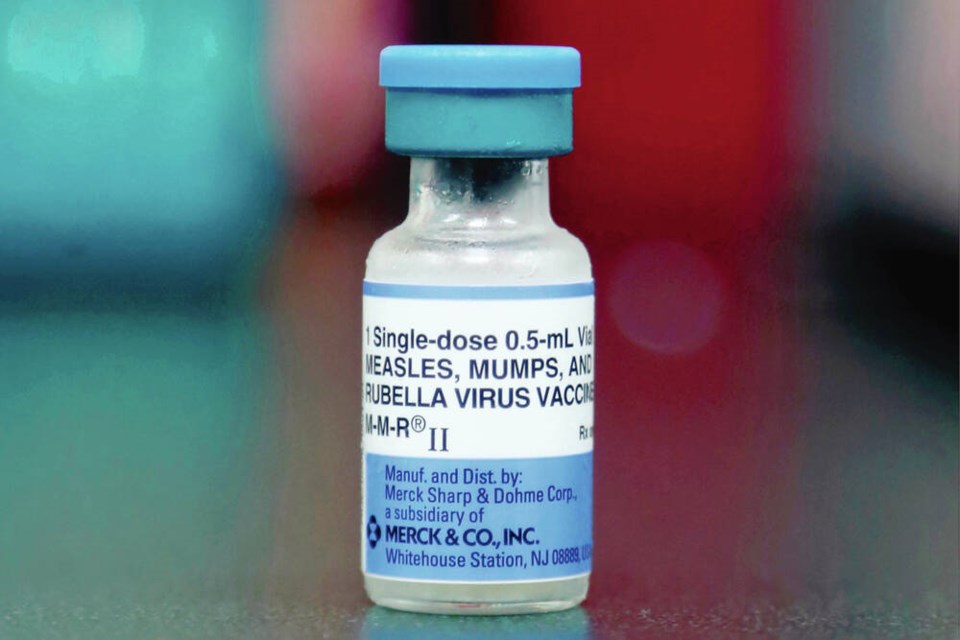Canada is in the middle of the largest measles outbreak it has seen in generations, with more than 2,500 cases reported.
But B.C.’s Health Ministry says it has no plans to make measles immunization mandatory for attending school, as it is in Ontario and New Brunswick.
Instead, the ministry will respond to outbreaks and exposures, as well as encouraging people to get vaccinated and opening school-based immunization clinics in some areas with low vaccination rates.
Measles can cause brain swelling that can lead to seizures, deafness, brain damage and even death.
Dr. Lyne Filiatrault, a retired emergency physician who helped prevent a major SARS outbreak in B.C. when her team isolated Vancouver’s first SARS patient, said not making the MMR — measles, mumps and rubella — vaccine a requirement to attend school is the wrong strategy to take with one of the most infectious diseases on the planet.
“Public health should be about protecting the most vulnerable,” Filiatrault said. Babies and immunocompromised people, such as people getting cancer treatment, rely on herd immunity, since they cannot be vaccinated against measles.
Public-health officers need to “have the guts to say, ‘If you want to go to school you need to be vaccinated’, ” said Filiatrault, adding with school wrapping up soon, now is an excellent time to roll out school-based mass-vaccination campaigns to catch up all school-aged kids on vaccines they might be missing.
Schools should also introduce vaccine mandates that will kick in for September when kids come back to school, she added.
Aside from the dangers of the disease itself, Filiatrault said, measles can cause what’s known as immune amnesia, where a meales infection can wipe out up to 70 per cent of a patient’s antibodies.
That hugely increases a person’s risk of getting sick and dying from an infection years after they recover from measles, said Filiatrault.
There are more measles cases in Canada than in the United States right now, which is concerning, she said, considering Canada has about one-eighth the population of the U.S.
In the week of May 11 to May 17 — the most recent data available — Health Canada said there were 194 new cases in Ontario, 135 in Alberta, 15 in Manitoba, eight in Saskatchewan and two in B.C.
B.C.’s cases will likely increase in September after people from Alberta travel to the Okanagan for summer holidays, Filiatrault said.
B.C. has been collecting data on which school-aged kids are vaccinated against measles, pertussis (whooping cough), mumps, rubella, varicella (chickenpox) and meningococcal disease (a bacterial infection that can infect the lining of the brain, spinal cord or blood) since 2019 through its Vaccine Status Reporting Regulation.
The regulation requires all school-aged kids in public, independent and home schools to provide up-to-date vaccination records for the Provincial Immunization Registry.
The Health Ministry says it can quickly respond to outbreaks and exposures using this database, which could mean recommending people immediately get vaccinated after an exposure to measles, or prohibiting unimmunized or under-immunized children from attending school until an outbreak is over.
In an emailed statement, the Health Ministry said there’s been an increase in the number of people getting vaccinated against measles since the outbreak was first reported in Eastern Canada.
From Oct. 1, 2024, to May 19, 2025, more than 72,500 doses of the measles vaccine were administered in B.C., of which more than half were kids getting their routine childhood vaccines, the ministry said.
That represents an 11 per cent increase from the same time last year in people getting vaccinated outside of routine childhood vaccinations, the ministry said.
The ministry said there has also been an increase in people uploading their immunization records through the province’s Health Gateway portal, where British Columbians can review their health records.
“If people are missing vaccines, now is the time to book an appointment to get up to date,” the ministry said.
Filiatrault said measles cases are often a sign that kids aren’t up to date on other key childhood vaccinations.
On Monday, Vancouver Coastal Health said there was an increasing number of pertussis infections — whooping cough — in the Pemberton area, and the health authority was encouraging people to get vaccinated.
Eight projects are underway in B.C., funded through the federal Immunization Partnership Fund, to improve vaccination uptake in under-vaccinated communities by focusing on education around the risks of measles infections and the benefits of vaccination, the ministry said.
From 1998 to 2024, measles was considered eliminated in Canada, with any infections that occurred during that time among Canadians deemed to have come from travelling abroad.
Now Theresa Tam, Canada’s chief public health officer, has warned that measles could become endemic, meaning people will continue to catch measles within Canada.
In Canada, about 87 per cent of adults are vaccinated against measles. Herd immunity for measles requires 95 per cent of the total population to be vaccinated.
The number is even low in certain geographic areas and populations. Only 62 per cent of school-aged kids are vaccinated against measles in the Kootenay Boundary Health Service Delivery Area, according to the B.C. Childhood Immunization Coverage Dashboard, for example.
B.C.’s routine childhood vaccination program recommends kids get their first measles shot at 12 months, and their second between four and six years old as they enter school. That schedule can be accelerated to the first shot at six months and the second between one and four years old if the family is travelling to areas where measles is spreading.
Anyone born before 1970 is assumed to be immune to measles because they would have been exposed as a child, but adults born after 1970 should get two doses of the vaccine, the ministry said.
The measles vaccine is free in Canada and available at most pharmacies for anyone four and older.
Michelle Gamage is a Local Journalism Initiative reporter with The Tyee. The Local Journalism Initiative is funded by the Government of Canada.




